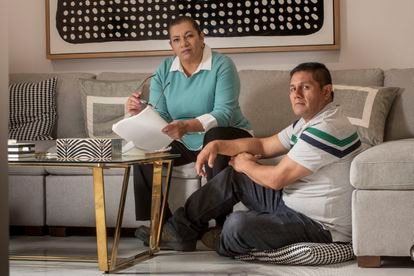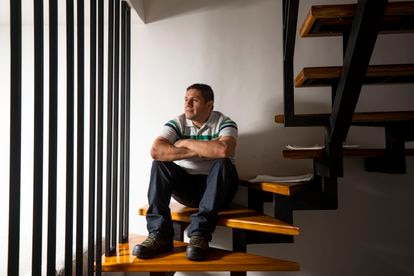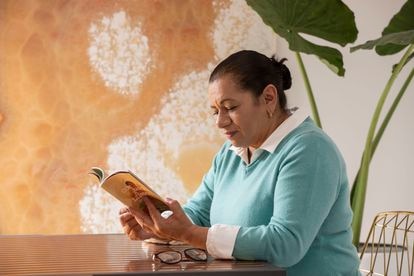
Lucía Alvarado worked at her house in Mexico City. Giselle Amador was the minister of health in Costa Rica. Martha — a fictitious name, to protect her identity — was a hairdresser in an Ecuadorian neighborhood. They all speak in the past tense about their jobs, because the imprisonment of Mario, Luis and Carlos forced them to become researchers, lawyers and human rights activists.
When their relatives were imprisoned, none of them knew about the rights of prisoners. And, before the arrests, they believed in the state. But not anymore.
“The state has too many prisoners. We are the only ones who take care of them; their mothers, their sisters, their daughters,” explains Martha by video call. Her son, Carlos — a name she has also chosen to protect his identity — was one of the 118 men murdered during the September 28, 2021 prison massacre at the Litoral Penitentiary in Guayaquil, Ecuador. He had been sentenced to four-and-a-half years in prison for stealing a cellphone.
Carlos — who died at the age of 19 — was finishing his barbering studies and had become a father just three months before he was killed. After the pandemic, Martha was fired from her job. The family’s debts soon exceeded $600. “I’m not justifying what he did, but the consequences were terrible for everyone,” his mother explains. “Economically, things were impossible — I had to take care of my daughter-in-law and my granddaughter, the debt, my mother’s cancer diagnosis… and, of course, I had to take care of him [while he was imprisoned].”
In addition to the costs of going to and from the jail, Martha says that she had to sell the phone, the television and all the appliances in the house to be able to pay for the extortion money he needed to protect himself inside the jail. “I paid to keep him from sleeping on the floor or to guarantee his protection. I don’t even know how much I spent,” she laments. Like her, 87% of female caregivers say they haven’t been able to make ends meet after the arrest of their loved ones, according to a report by RIMUF — the International Network of Female Relatives of Detained Persons. The majority of male prisoners — 75% — were the heads of their households pre-incarceration.
On the morning of September 28, Martha learned that her son was one of those killed at the gates of the Guayaquil prison. Another mother went to the jail, looking for information about the shooting — she managed to contact her son through a video call. Martha asked him to move the camera around — that’s when she saw Carlos, lifeless, face down in his cell.
“There’s no consolation. But at least they gave me [his body] in its entirety. There were women who buried only a few parts of their children’s bodies. We were a handful of mothers, devastated by the news.”
Women carers are the norm. They represent at least 80% of those who visit their relatives in prison. “It’s amazing to realize that, when the woman is the one who’s sent to prison, either her mothers and sisters visit her… otherwise, nobody goes. Usually, men don’t take care of them,” Alvarado sighs. She’s a member of RUMF. According to the organization, for every prisoner, there’s a support network of five women around them.
These women complain that extortion is a constant within Latin American jails. Overpopulation is one of the main causes of a failed prison system. In the last two decades, the prison population in Latin America and the Caribbean has skyrocketed by 120%, while in the rest of the world, it has only increased by 24%. But despite the massive increase in Latin America and Caribbean, there hasn’t been any significant increase in expenditure on the penitentiary system.
The combination of overcrowded prisons, underinvestment in restorative approaches and the growing power of gangs and armed groups result in corruption sneaking through the prison bars. “In addition to the lack of control due to overcrowding,” Alvarado explains, “there’s a tendency to ignore those who are deprived of their liberty. The only right that’s annulled is that of free movement, but all the others — work, health, education — continue to be rights. Yet in jail, they don’t seem to exist.”
She knows this from experience. Her brother, Mario, was tortured in jail after being arbitrarily detained for allegedly trafficking 19 tons of heroin during a work shift at the airport — a shift that he never took. This was 2007 and Mexico was in the middle of the war against drugs. For Lucía Alvarado, nothing made sense: “It was so clear to see that he didn’t do it… we thought it would be solved in a matter of hours. But he spent seven years in jail.”

Amador notes that the extortion happens with the consent of prison officials. “And the lawyers who offer to take on your case also ask for thousands of dollars under the table to supposedly get better results. It’s all a business.” Her son, Luis — along with four friends — was sentenced to eight years and four months in jail for planting cannabis, a crime against public health in Costa Rica. Months before the arrest, President Carlos Alvarado Quesada asked for her resignation from his cabinet, without giving any further explanation. “I was ‘inconvenient’ as minister of health, because I didn’t give in to the tobacco companies or the pharmaceutical companies,” she argues. “[My son’s arrest] was the excuse they found to get rid of me. And, along the way, I lost all my savings — over $60,000. My health was also lost in the process…”
“I lived for him”
Jail has many consequences, and they don’t only affect prisoners. They have a direct impact on the health, economy and psychology of the families of incarcerated people. Alvarado acknowledges that “she doesn’t remember when was the last time she did something” for herself. “My life became about getting my brother out of jail. I lived for him.”
Martha describes the process as if her life was over. For Amador, therapy was necessary “to go out into the streets again,” without feeling stigmatized by society. Some 85% of the women surveyed by RIMUF reported deteriorated mental health and frequent episodes of stress, anxiety and sadness. This is the same percentage that admits to having faced poor or terrible treatment from prison officials, ranging from harassment and sexual abuse at security checks while making visits, to death threats.
“Caretaking tasks aren’t a choice. [They are compounded by] the patriarchal society and [poor prison conditions],” reads the study that was carried out among 188 family members of prisoners from eight countries. Currently, there are 1.5 million incarcerated people in Latin America’s prisons. In addition to the poor infrastructure, there’s a deficit in the coverage of basic services in the prison system. Almost 60% of incarcerated people don’t have a bed, 29% don’t have access to health services and 28% don’t have access to basic goods, such as soap and water, according to data from the Inter-American Development Bank (IDB).
One in three prisoners hasn’t been sentenced
In Latin America and the Caribbean, the percentage of people deprived of liberty without having been sentenced is 36%, according to a pretrial detention figure. According to the Inter-American Commission on Human Rights (IACHR), the application of this measure is one of the most serious and widespread problems faced by the countries of the region, since it contravenes the right to the presumption of innocence and heavily impacts low-income and migrant families.
Nathalie Alvarado — coordinator of citizen security and justice at the IDB — assures EL PAÍS that the overcrowding that pretrial detention entails generates “inhumane conditions in prisons, more violence and victimization, as well as fewer opportunities for rehabilitation.” This problem, she says, has led countries such as Chile to implement the Sayén Law, which establishes alternative measures and limits the use of this legal method from being imposed on pregnant women or mothers who have children under the age of two. “Defendants who aren’t released before trial are less likely to prepare an adequate defense and more likely to receive a custodial sentence, obtain longer sentences and plead guilty,” Alvarado warns.

For Alvarado, this is the first judicial measure that needs to be eradicated on the continent. The other key is that the courts take gender into account, recognizing the weight that is put on women and children following an arrest. “The state has to find a way to guarantee that families have a livelihood, either with subsidies, or by promoting employment inside prisons and paying the salaries of these female heads of families. We must think of solutions so that women and girls aren’t also imprisoned.”
Sign up for our weekly newsletter to get more English-language news coverage from EL PAÍS USA Edition
This post was originally published on this site be sure to check out more of their content.






